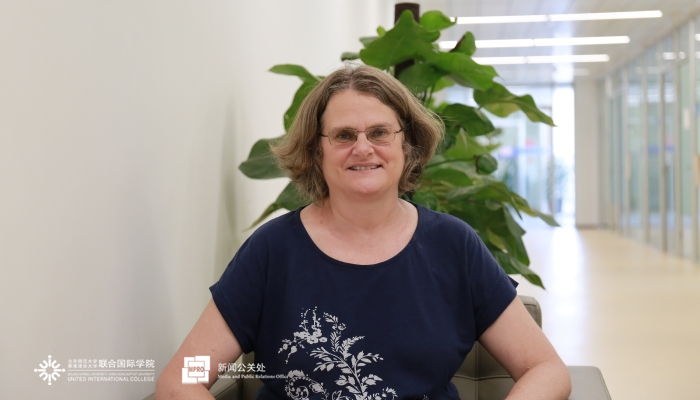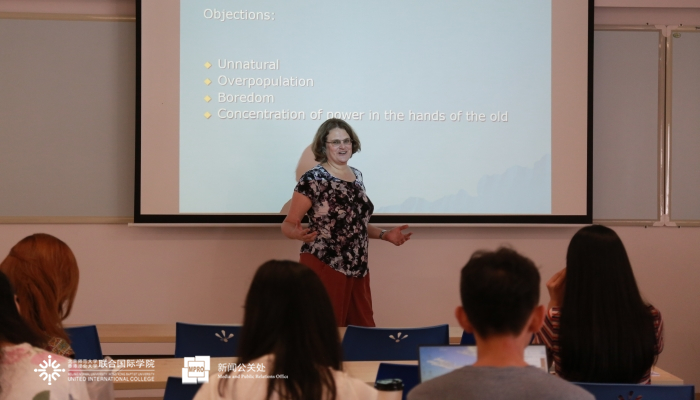“
UIC倡导和推行“博雅教育”。在美国,品质最好的大学及学院很多都采用博雅教育。可是,在中国的大学体系里,对于“博雅教育”还是相当的陌生。
“博雅之我见”是UIC杂志《博雅行》特设栏目,将以话题式的讨论,带领大家共同揭开“博雅教育”的面纱。这里有中外思想的百家争鸣,更有对博雅教育真实的体验和有温度的故事,让我们一同探寻博雅教育的本质。
”

|
凯莉·茵格丽丝现任UIC通识教育办公室助理教授,目前已在UIC任教五年。1984年,凯莉作为杭州大学(现为浙江大学一部分)的交换生首次来到了中国。她曾在香港生活了20多年,并在香港大学获得哲学博士学位。
Kelly Inglis is Assistant Professor of General Education Office and has been teaching at UIC for five years.She is an American, but has been living in Hong Kong for over 20 years.She received her PhD in Philosophy from the University of Hong Kong.Kelly first visited China in 1984, when she was an exchange student at Hangzhou University (now part of Zhejiang University).
|
To study the liberal arts is to learn to think independently and to develop new perspectives with which to evaluate familiar experiences and established knowledge. It is through this study that we nurture the mindset needed to do new and original research.Rethink research A traditional education in science is aimed at informing students about what has already been learned and what theories have already been developed. To make contributions to a discipline, we need to understand the current state of the discipline. This is the foundation on which most new research is built and is what Thomas Kuhn calls “normal science”. However, sometimes to make progress, we must rethink our established theories and consider beginning again with an entirely new set of assumptions. This is what Thomas Kuhn calls a “paradigm shift”.Examples of paradigm shifts that have revolutionized our understanding of the world includethe theory of evolution, the theory of relativity and quantum mechanics.
To prepare students to be able to rethink conventional wisdom, it is essential to make students think for themselves and to have thoughts that they have never had before.That is one of the primary goals of the liberal arts and is exemplified in philosophy. Philosophy forces us to question everything that we normally take for granted. What is real? What is a person? Where did the world come from? What is time?Students who are very practicallyminded sometimes object to philosophical thought experiments because they seem to have nothing todo with real life. For example,when I discuss with my class what would happen if a woman traveled back time and tried to shoot her own grandmother, I am sometimes met with impatient indifference. They think that’s never going to happen, so why try to imagine it? I remind them, however, that when Einstein tried to imagine what it would be like to ride on a beam of light, the ideas which that absurd notion provoked eventually led him to develop the theory of relativity.

Think independently
It is not enough, of course, to simply think new thoughts or imagine strange scenarios. You must also critically examine these ideas, and to do that, you need to have the skills and the courage to think independently. One of the most important roles of a liberal arts education is to develop those skills and nurture that courage. This is an on-going theme in the classes I teach. During my course “Conceptions of Nature from Aristotle to the 20th Century”, for example, I taught students about how different civilizations throughout history have regarded nature, and I began with Aristotle.After a few lectures, a student said to me, “I’m confused. Last time you told us that nature has a plan, and today you tell us that nature doesn’t have a plan!” I explained that I had not told the class that nature had a plan, but rather that Aristotle believed that nature had a plan. Later I told the class that according to evolutionary theory, nature does not have a plan. I was not telling him what to believe about nature, but rather introducing him to different views of nature that had been held by different people in different cultures. “So which one is right?” he persisted. I explained that it was not my job to tell him which view was right: that he needed to think for himself.If you freely exercise your imagination but do not use critical thinking to analyze the consequences, then imagining riding on a beam of light might inspire you to write a comic book. However, if you use your understanding of physics and apply logic to your daydream, then imagining riding on a beam of light might inspire you to develop a new theory about the fundamental laws of the universe.
Question everything
Theliberal arts in general, and philosophy in particular, prepare students to question established beliefs, consider ways in which things might be different, analyze the implications of those differences,and eventually synthesize the analysis of possibilities with the observation of realities in order to produce a deeper understanding of whatever subject the students apply themselves to.A passive thinker can do normal science but to revolutionize our understanding of how the world works, it is necessary to be in the habit of questioning even the most obvious “truths” and to take seriously the consideration of the seemingly impossible. As Einstein said in a letter to a friend in 1944, “This independence created by philosophical insight is – in my opinion – the mark of distinction between a mere artisan or specialist and a real seeker of truth.”
美国学者凯莉·茵格丽丝认为博雅教育的学习实际上是让学生学会独立思考,重新审视过往经历和传统观念,同时在已有知识体系的基础上建立新观念的过程。唯有通过这样的学习,才能培养学生崭新的原创性研究思维方式。她认为博雅教育的目标,很重要的一点是让他们学会自主思考,甚至敢于萌生出从未有过的想法;同时让学生学会对新观念进行批判性思考。她有一次上课时与学生探讨他们从未设想过的事,当时有些学生觉得思考这些事简直不可思议。当时她提醒学生,如果爱因斯坦从没想象过人可以和光跑得一样快、设计追光实验的话,他很可能不会发明相对论。“然而,假如你想象自己能和光跑得一样快,但却没有用批判性的思维方式来分析,这样的想象也许会让你画出一本连环画;而假如你了解物理学,为自己的想象增添逻辑性,想象自己跑得和光一样快也许会让你在现有宇宙基本法则的基础上研究出一种新的理论。”她认为,总体而言,博雅教育旨在培养学生质疑已有观念的能力,让他们思考事物之间的差异,体会这些差异带来的启示,最终通过对现实的观察分析出多种可能性,从而对自己所学的科目有更深刻的理解。
本文刊载于第六期《博雅行》,欢迎在校园各取阅点“拿一份”阅读更多内容。
第六期《博雅行》电子版:http://web.uic.edu.cn/cn/mpro/148-mpro/magazine/4744-2018-07-02-08-22-25
如果你也对博雅教育有所感悟,欢迎投稿至mpro@uic.edu.cn,本栏目约稿长期有效哦。
文字:凯莉·茵格丽丝 刘盛娟(翻译)
图:廖秋娴
编辑:温铭辉
(来源:365best体育官网入口公关处)
